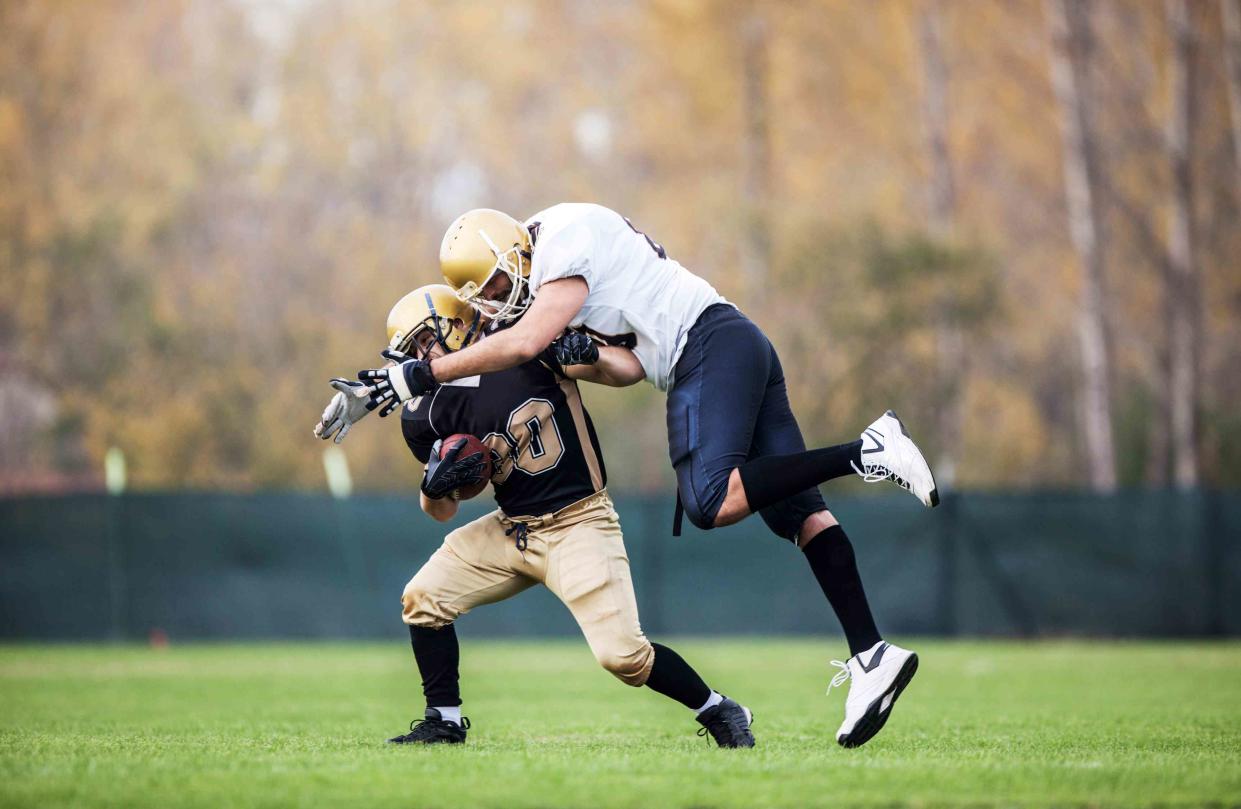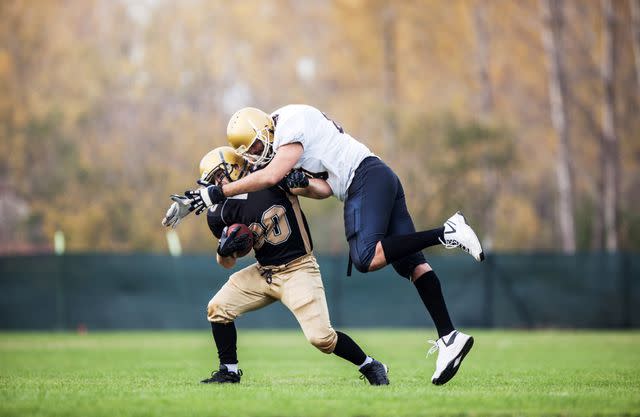What Is a Concussion?

skynesher / Getty Images
A concussion is a type of traumatic brain injury (TBI) that can happen during sports, an accident, or other events involving a blow to the head. The force from the hit that causes a concussion makes the head and brain move back and forth rapidly, leading to brain cell damage and chemical changes in the brain. A concussion should be taken seriously.
This article discusses types of concussions, signs and symptoms, treatment, recovery, and how long a concussion lasts.

skynesher / Getty Images
Types of Concussion
Historically, concussions were graded by severity, with a higher number indicating a more severe concussion. However, clinicians could not always agree on what defined each severity level.
Sometimes, concussions are defined by where they cause the most symptoms. For instance, an ocular concussion may make it hard to read for an extended period or to look at a computer screen or phone. A cervical concussion puts pressure on the neck or spinal cord and may cause headaches.
Here are the symptoms distinguishing a mild TBI from a moderate to severe one.
Mild
Symptoms of a mild TBI, including concussions, include:
Blurred vision
Mood changes
A loss of consciousness (does not always occur with a concussion)
Severe
The symptoms for a moderate to severe TBI may be the same as a mild TBI, but the symptoms may be more extreme, including:
Vomiting or nausea
Loss of coordination
A persistent headache or a headache that gets worse
Having one or both pupils (the dark center part of the eye) larger than normal
Signs and Symptoms of a Concussion
A concussion can have many different symptoms. Here are the signs you may have if you've had a concussion or the symptoms to watch for if you think someone around you has had a concussion.
How to Tell if You Have a Concussion
Here are some symptoms you may experience if you have a concussion:
Concentration problems
Feeling dizzy
Feeling more groggy or fatigued
Headaches
Nausea or vomiting
Not feeling like yourself
Having trouble tolerating lights or noise
Signs in Someone Else
The signs you may observe in someone you think has had a concussion include the following:
Not remembering events right before or after a hit or fall
More clumsy movements
Not being able to keep up with instructions as they usually would
Behavior or personality changes
Losing consciousness
Athletes who play certain sports are at a higher risk for concussions. The top five sports with the highest number of head injuries treated in ERs include the following, in ranked order:
Cycling
Football
Baseball and softball
Basketball
Powered recreational vehicles, such as ATVs
When to See a Healthcare Provider for a Concussion
Seek emergency medical treatment for a concussion if any of the following symptoms occur:
Loss of consciousness, even just for a second
Confusion
Convulsions
Drowsiness
Nausea or vomiting
Seizures
Slurred speech
Weakness or numbness
If the person suspected of having a concussion has no emergency symptoms, you should closely monitor them in the days following their head injury. Contact a healthcare provider if new symptoms emerge, such as headaches, new concentration problems, or dizziness. When in doubt, seek medical care.
How Long Does a Concussion Last?
Most people who have had a concussion feel better after a few weeks. The average recovery time from a concussion is 10 days. However, some people will have symptoms that last for a few months.
Let a health provider know if concussion symptoms are not going away or if they worsen when resuming normal activities again.
A mild, one-time concussion does not typically cause permanent damage. There could be permanent effects if a second concussion occurs shortly after the first.
After Effects and Post-Concussion Syndrome
When concussion symptoms last longer than the average time window and impact normal activities of daily living, they are considered post-concussion syndrome. A healthcare provider may diagnose post-concussion syndrome after one to two months of persistent symptoms.
An estimated 10% of high school athletes with a concussion will experience post-concussion syndrome. The percentage of post-concussion syndrome among other populations ranges from 5% to 30%.
Symptoms associated with post-concussion syndrome include:
Headaches
Dizziness
Fatigue
Sleeping more but also having trouble falling asleep
Trouble concentrating and focusing
Anxiety and depression
Feeling more irritable
There are treatments for post-concussion syndrome, so continue to see a healthcare provider if you or someone you care for may have this aftereffect from a concussion.
How Healthcare Providers Tell if You Have a Concussion
There's no specific test to diagnose a concussion, so healthcare providers gather imaging tests and information to determine whether someone has had a concussion.
If an athlete has a suspected concussion while participating in sports, a medical trainer may perform a Sideline Concussion Assessment Tool (SCAT-2) test on the sidelines. This covers questions about symptoms, memory, balance, and coordination.
A healthcare provider will ask questions about the loss of consciousness or memory loss (retrograde amnesia) associated with the suspected concussion. The provider will also ask about concussion-related symptoms.
Tests that a healthcare provider may use to help determine a concussion diagnosis include:
A magnetic resonance imaging (MRI) or computed tomography (CT) scan
A strength and balance test
A reflex test
A coordination test
Neuropsychological testing (to check for thinking or memory problems)
Concussion Treatment
The primary recommended treatment for a concussion is rest. This means avoiding physical activities, electronic devices, and reading, all of which can worsen concussion-related symptoms. Mental tasks such as homework or regular work also may make symptoms worse.
For children, rest will include taking time off from school and sports. A healthcare provider can give more guidance on when a child can return to school after having a concussion and may recommend starting with half days.
There also are steps to follow on returning to athletics, ranging from light aerobic activity to full contact and participation in competition as the final steps.
A person with a concussion must see their healthcare provider again for another medical exam before they are cleared to return to normal activities.
Sleep is an essential part of concussion recovery. Having a concussion may affect your ability to fall and stay asleep. Some tips for a better night's sleep include:
Going to sleep and waking up at consistent times every day, even on the weekends
Establishing a pre-bedtime routine, such as listening to relaxing music and avoiding the use of electronics
Avoiding caffeine in the afternoon and evening
Giving yourself adequate time to sleep each night. Most adults need seven or more hours of sleep. Teens age 13–18 need about nine hours of sleep a night.
Talk to a healthcare provider if you have trouble sleeping during concussion recovery.
Stages of Recovery From a Concussion
There are three stages of concussion recovery, including the acute symptomatic, recovery, and recovered phases.
Acute Symptomatic Phase
The "acute symptomatic phase" occurs immediately after the concussion and generally lasts less than three days. You should spend the first day or two after a concussion resting. After the first couple of days, you may begin to incorporate light mental and physical activities like watching TV or going for short walks, as tolerated.
It's normal to experience some concussion symptoms during this phase. However, you should seek emergency care if any of the following occur during this time:
Loss of consciousness
Repeated vomiting
Severe neck pain
Increased confusion
Double vision or vision loss
Recovery
During the "recovery" phase of a concussion, symptoms decrease, and the ability to perform more thinking skills and physical activities without symptoms should occur. Newer research recommends that some exercise during the recovery phase instead of complete rest may aid in concussion recovery.
However, this means exercise like walking or using a stationary bike versus weightlifting or other strenuous exercises that can make symptoms worse. Talk to your healthcare provider before introducing exercise after a concussion.
Recovered
The "recovered" phase indicates that the concussion symptoms are no longer active and it is safe to return to normal activity. Work closely with a healthcare provider to determine your concussion recovery timeline.
Concussion Prevention Protocol
Organizations, including the National Football League (NFL) and the Centers for Disease Control and Prevention (CDC), have designed concussion protocols to establish guidelines for when players can safely return to a sport after a concussion. These protocols assess the following:
Evaluation for concussions and how to evaluate signs and symptoms
Activity recommendations while recovering and a timeline for reintroducing these activities
Benchmarks to pass before safely resuming normal activities
The CDC's protocol for concussions recommends a rest period of 24–72 hours and then the following progression:
Rest and return to limited activity
Light aerobic exercise
Sport-specific exercise
Non-contact drills
Full-contact practice
Return to play
Organizations like the NFL are making changes to try to reduce concussions. This includes using "guardian caps," mushroom-shaped padded coverings over helmets during practices. However, the research on the effectiveness of these devices is mixed, and additional studies are necessary to confirm their benefit in reducing concussions.
Outlook
Most people who have a concussion recover from them fully with adequate rest and a gradual return to activity. Working with a healthcare provider and following any guidelines during concussion recovery is important. Having multiple concussions can raise the risk of longer-term effects.

